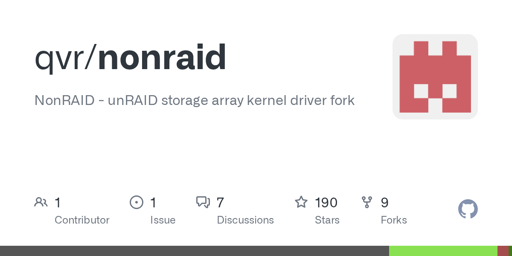Has anyone messed around with NonRAID?
(github.com)
from nickiam2@aussie.zone to selfhosted@lemmy.world on 19 Oct 2025 01:09
https://aussie.zone/post/25841020
from nickiam2@aussie.zone to selfhosted@lemmy.world on 19 Oct 2025 01:09
https://aussie.zone/post/25841020
I just found this project by browsing the mergerfs documentation. It claims to be an opensource fork of the Unraid software that makes it so flexible. The documentation isn’t great, but has all the basic info to get going. It works kinda like Snapraid in that each disk has it’s own filesystem and parity is calculated across all of the drives, but it happens in real time (unlike with snapraid).
Thoughts? comments? Would you trust this with important data?

#selfhosted
threaded - newest
No, I would not trust it with important data.
Yeah yeah yeah but ignoring that… Would you?
What is the gain compared to running something battle tested like zfs or mdraid?
The selling point of unraid is that you can mix and match different disk sizes and it figures out a (good, efficient?) way to handle them even as you grow a pool. You’re not going to have a good time with a 1TB drive, a 2 TB drive and a 15 TB drive using zfs, unraid doesn’t care… (Using and preferring zfs myself, by the way; this is heresay.)
Ah, I can see the appeal but it’s not for me then. :)
@dont @anamethatisnt What’s the advantage over single node Ceph, then?
Another benefit is if you lose your all parity disks and a data disk, you can still access the filesystem on the other data disks. So if the array fails, you don’t lose all the data, just the 1 (failed) disk worth of files.
ZFS AnyRaid soon?
How long did it take to get zpool-attach? I will not join the waiting list 😉
Cool idea!
But why would I use it? What advantage does I give me over traditional MD? The opportunity to use different filesystems on different disks? Or hot-add already formatted disks? I don’t really get it.